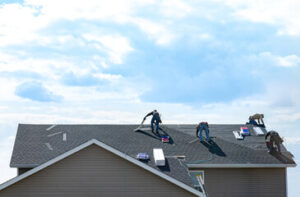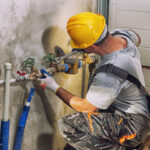Home » Posts tagged 'roofing installation'
Tag Archives: roofing installation
What to Look For in a Roofing Company
A good roofing contractor should be able to provide a detailed proposal for your project. This includes a description of the work that will be completed, materials needed and a payment schedule.
It should also include any manufacturer or installation warranties included in your project. This will protect you if something goes wrong during the repair process or if your new roof fails to perform as expected. Contact Roofing Company Near Me for professional help.
A roofing contractor with extensive experience is more likely to provide high-quality workmanship and customer service. This is because they understand roofing systems, materials, and the industry’s best practices. They can also help homeowners navigate the process of obtaining building permits and adhering to local regulations. Moreover, a roofing company with local roots can better understand the area’s unique challenges and provide effective solutions.
When evaluating potential contractors, ask for references and examples of their work. A reputable contractor will be more than happy to share their portfolio and project experience with you. In addition, they should be willing to provide a detailed estimate that includes costs of materials, labor, and permits. This will prevent any misunderstandings and ensure that you receive the value you’re paying for.
Checking online reviews on websites such as Google or Yelp is another way to assess a roofing company’s reputation. Positive reviews often highlight professionalism, quality of work, and excellent customer service. Negative reviews, on the other hand, can reveal recurring issues or dissatisfaction.
Homeowners can also look for a roofing contractor that has a local presence and is actively involved in community initiatives. This can indicate a commitment to the community and a dedication to providing outstanding customer service. In addition, a local roofing contractor is more likely to be accessible for follow-up services and inspections.
Moreover, when evaluating potential roofing contractors, pay attention to their safety practices. Roofing work is typically hazardous, and a reliable roofing company will be committed to safety protocols and compliance with industry standards. They will also ensure that their workers are properly trained and equipped to minimize risks and avoid accidents on the job site.
Choosing the right roofing contractor is an important decision for homeowners. In addition to ensuring that the contractor is licensed, insured, and qualified, they should have a solid track record of customer satisfaction. Additionally, a roofing contractor should be familiar with the specific roofing system that you’re considering, and they should offer manufacturer warranties in addition to their own workmanship warranties. These warranties can protect you against future repairs and maintenance costs.
License
Roofing contractors need to be licensed at the local or state level in order to provide services. The license typically indicates that the roofing contractor has met specific training requirements and passed exams to prove their knowledge of industry standards and regulations. Licensed roofers are likely to carry liability insurance and workers’ compensation, which protect homeowners in the event of any accidents on their property. They are also likely to be knowledgeable about local building codes and safety requirements.
Many states and regions have online portals for verifying a contractor’s license. These sites allow users to enter a license number or name and receive instant information on the status of the license, including validity, expiration dates, and any disciplinary actions. The availability and depth of this information varies by region, but you should be wary of any contractors who are reluctant to share their license number or have a history of disciplinary action.
If you have any doubts, it may be helpful to consult your state or local consumer protection agency. They may be able to recommend reputable contractors or can provide additional resources, such as contact information for past clients. Additionally, you should never sign a contract without reading it completely. Ensure that the contract clearly indicates all payment details, such as the amount due and when each payment will be made. It is also important to understand the terms of any warranties or guarantees provided by the roofer.
Regardless of whether you need a roof repaired, replaced or installed, a qualified and experienced roofing contractor will be able to advise you on the best materials and techniques for your particular project. Roofing contractors have a deeper understanding of the various roofing materials, techniques and industry standards than general contractors, so they are more equipped to help you choose the right roof for your home. This will help ensure that your roof is both safe and beautiful for years to come. Roofing contractors are also more familiar with construction contracts than general contractors, so they will be able to avoid common pitfalls and delays that can occur when a contract is not written correctly.
Insurance
Roofing can be a dangerous job, especially if the roofer is using power tools at heights. Even small mistakes can have major consequences. Having the right insurance is essential for a roofing company. It covers their work and protects clients from unnecessary expenses. It also helps them avoid costly lawsuits that could bankrupt their business. A roofing company without the proper insurance may be cutting corners in other ways, such as by skimping on safety protocols or relying on cheap materials. This can result in shoddy work or further damage to the property.
Inland marine insurance is a must for any roofing company that uses expensive tools and equipment. It covers their items while in transit or at the job site against theft, fire, weather, and other risks. It also covers the cost of replacing these items if they are damaged or lost. This type of insurance is often included in a general liability policy or sold separately as a standalone option.
Workers’ compensation insurance is also a must for any roofing company. It covers the medical bills and lost wages of workers who are injured on the job. Roofing is a dangerous job, and accidents can happen at any time. Without this insurance, the homeowner is responsible for any medical bills or legal action.
General liability is a must for any roofing company. It provides coverage for third-party bodily injury, property damage, and advertising injuries. It is an important part of any New York City roofing contractor insurance program and protects against financial ruin due to damages.
Lastly, a roofing company must have commercial auto insurance to cover any liabilities from vehicle accidents during business trips. A standard personal auto policy does not usually include this type of coverage. Typically, annual premiums are between $2,000 and $4,500 per vehicle.
Roofing contractors often use chemical products to seal, spray, and coat roofs. These products can be toxic if inhaled, so it is essential that a roofing company have pollution liability insurance. This type of coverage covers the discharge, dispersal, seepage, migration, release, or escape of a pollutant and is often included in a general liability or professional liability policy.
Warranty
Roofing warranties provide peace of mind to homeowners who seek robust protection for their investment. However, it is important to understand the differences between roofing warranty options and their terms and conditions. These terms can affect the duration and extent of protection offered by a roofing warranty. For instance, a premium warranty from a roof coating manufacturer typically requires the installer to perform regular inspections and cleaning of the coating system. Failure to follow these instructions can result in the voiding of the warranty.
Other common roof warranty terms and conditions include exclusions for certain types of damage. For example, most manufacturers will not cover the cost of replacing shingles or other roofing materials if they become damaged by wind or hail. Some warranties will also exclude damage caused by normal aging or gradual deterioration of the roofing material over time. Likewise, most manufacturers will not cover damage to other components of the roofing system like flashing, underlayment, ice and water shield, and ventilation products.
The type of warranty you choose will depend on your needs and the quality of roofing materials used in your home. Some top-rated roofing brands offer comprehensive warranties that cover all aspects of a roofing system for a long period. However, these warranties often come with a higher price tag. A reliable roofing company will have a good relationship with the manufacturer and can negotiate with the manufacturer to ensure that their clients are provided with the best warranties.
In addition to reading the warranty terms and conditions carefully, it is important to keep records of all inspections, repairs, and maintenance performed on your roof. This will help you avoid costly repairs or replacements and ensure that your roofing warranty remains in effect for the full duration of its coverage. Additionally, it is crucial to store the warranty document in a safe place for future reference. It is also a good idea to consult with a roofing expert if you have any questions or concerns about the warranty.




